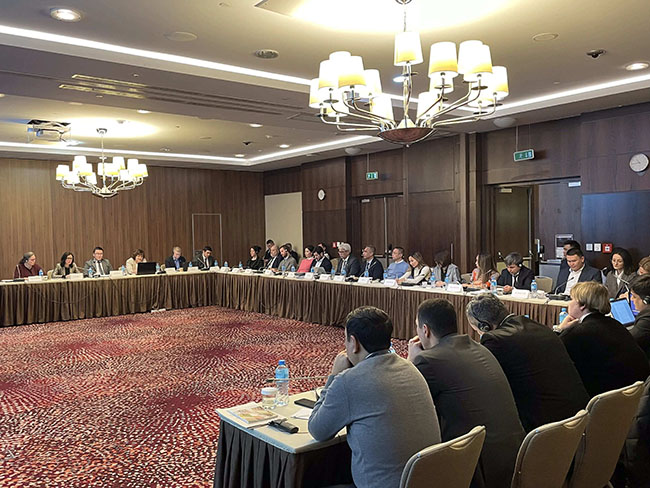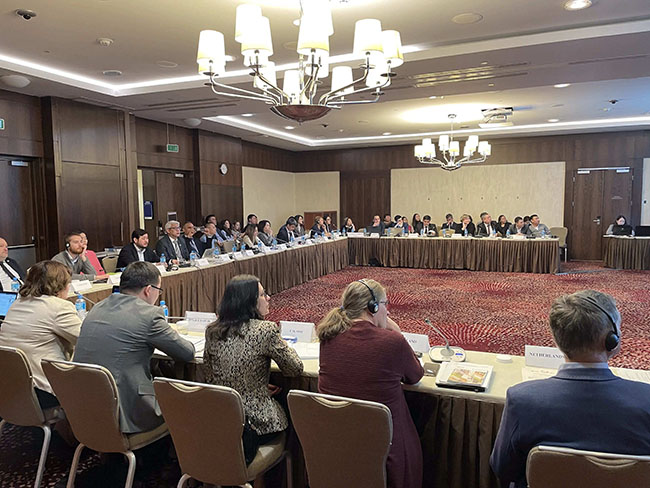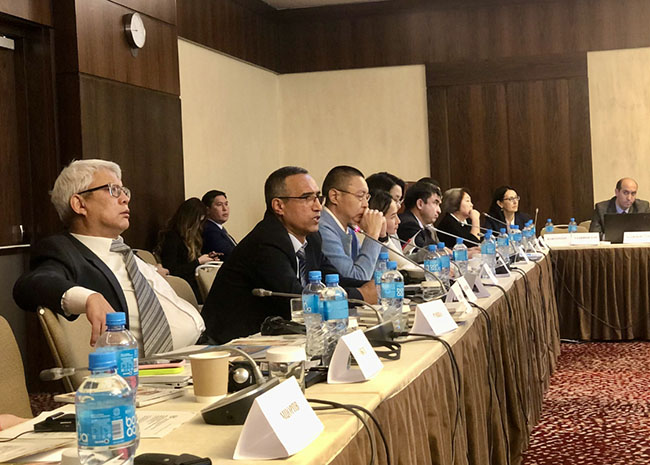REGIONAL WORKSHOP ON MONITORING, ASSESSMENT AND INFORMATION SHARING IN TRANSBOUNDARY BASINS IN CENTRAL ASIA
On February 1-2, 2023, Astana hosted a Regional Workshop on Monitoring, Assessment and Information Sharing in Transboundary Basins in Central Asia. The workshop was organized by the International Water Assessment Centre (IWAC) in cooperation with the United Nations Economic Commission for Europe with the financial support of the German International Cooperation (GIZ) under the Green Central Asia Program.
The workshop was attended by experts from five countries of Central Asia (Kazakhstan, Kyrgyzstan, Tajikistan, Turkmenistan and Uzbekistan), representing state bodies and national services responsible for water resources, the environment and hydrometeorology, as well as specialists from scientific institutions, basin water management organizations and international organizations operating in the region.
The purpose of the workshop was to assist countries in studying international experience in monitoring, assessment and information sharing in transboundary basins and discussing opportunities for strengthening cooperation between Central Asian countries in the field of protection and use of water resources in transboundary basins.
The agenda of the workshop consisted of an opening session, five thematic sessions, panel discussions and a final session.
- Session 1. “Hydrological monitoring and water quality regulation system in Central Asia”.
- Session 2. “Experience of cooperation on monitoring, assessment and exchange of information on water in Central Asia”.
- Session 3. “Guidelines for monitoring and assessment of transboundary rivers, lakes and groundwaters under the Water Convention”.
- Session 4. “International practice of monitoring, assessment and data exchange in transboundary basins”.
- Session 5. “Strengthening regional cooperation on monitoring, assessment and exchange of information on water in Central Asia”.


Mr. Alisher Nazari, Deputy Director, SIC ICWC made a presentation on “Monitoring of water resources in transboundary rivers of the Aral Sea basin using the SIC ICWC Regional Information System” at session 2.

On the first day of the workshop, the group work was organized to discuss cases for the new publication “Good practices and lessons learned in transboundary data exchange”.
On the second day, following thematic sessions, the group work was conducted to discuss the prospects for development of regional cooperation on monitoring, assessment and information sharing on water in Central Asia.
As a result of the discussions, the participants of the workshop decided the following:
- express gratitude to the Green Central Asia Program of the German International Cooperation (GIZ), the United Nations Economic Commission for Europe and the International Water Assessment Centre for organizing the workshop;
- note the relevance of studying international experience in monitoring, assessment and information sharing for the development of joint actions and a common vision for the use of water resources in Central Asia;
- note the relevance of using the publication “Strategies for Monitoring and Assessment of Transboundary Rivers, Lakes and Groundwaters” (Updated Edition), prepared under the Convention on the Protection and Use of Transboundary Watercourses and International Lakes, as a methodological tool for developing cooperation between the countries of Central Asia on the protection and use of water resources;
- note changes in hydrological conditions and water needs that require a joint assessment of their dynamics, and development of a transparent exchange of data and information, automated monitoring and modeling;
- emphasize the relevance of long-term regional efforts to develop monitoring, assessment and information sharing on water resources, providing measures to harmonize methodologies and standards for data collection, formation of a regional network for monitoring the quality of transboundary waters, creation of effective organizational, legal and financial mechanisms for regular exchange of data in transboundary basins;
- note the need to develop basin agreements or other arrangements for monitoring, assessment and information sharing on transboundary water bodies, including mechanisms for implementation of joint monitoring programs and regular data exchange;
- recommend the governments of Central Asian countries to study the possibilities of creating a sustainable regional information system for the exchange of data and information on the quality of transboundary waters, considering the possibility of its integration with existing databases on water resources in the region;
- note the need to develop joint measures to create systems for prompt notification of pollution of transboundary waters and response to them;
- emphasize the relevance of developing measures to introduce hydrobiological monitoring and monitoring of the quality of bottom sediments on transboundary rivers;
- note the need for a joint inventory of existing or potential sources of pollution of transboundary water bodies in the region;
- note the need to develop joint measures for climate change adaptation;
- request international organizations to assist the countries of Central Asia in capacity building, including: (1) conducting educational seminars, trainings, workshops and other events on hydrological monitoring and cooperation on water quality in Central Asia; (2) development of joint methodological manuals for the analysis, processing and visualization of monitoring data;
- note the need for active high-level participation of the countries of Central Asia, as well as the stakeholders of the region, in the 2023 UN Water Conference in order to draw international attention to the achievements and needs of the region.
Source: IWAC
|